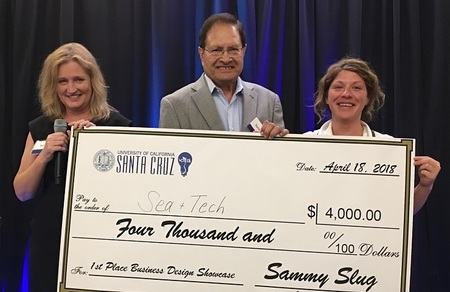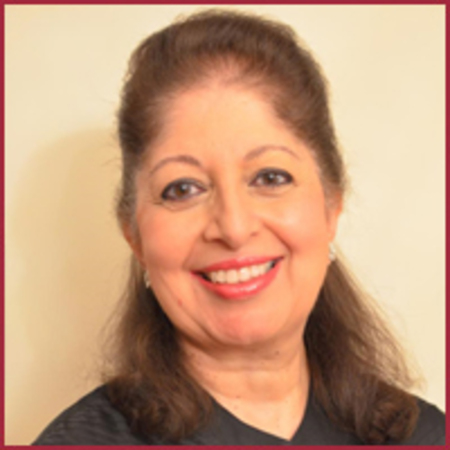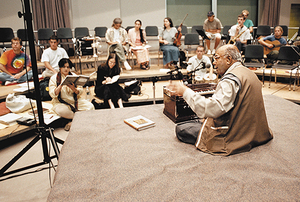Sharing their vision
Over more than two decades, Kamil and Talat Hasan’s extraordinary philanthropy has transformed multiple areas across UC Santa Cruz.
In the 1990s, when they were both well into successful careers involved with Bay Area technology businesses, Kamil and Talat Hasan decided to endow an academic chair in Indian classical music.
Kamil Hasan had gotten his Ph.D. at UC Berkeley and was a Stanford professor, but neither of these more established universities responded as enthusiastically to the Hasans’ ideas as they hoped.

They found UC Santa Cruz receptive to their vision of an endowed professorship that could introduce undergraduates to the form, provide specialized instruction, and convene performances. Now, two decades into the couple’s relationship with UC Santa Cruz, Kamil Hasan chairs the trustees of the UC Santa Cruz Foundation, and the Hasans’ philanthropy has branched out to other areas of the campus.
Talat Hasan says the administration responded to them enthusiastically, eager to make the gifts achieve the Hasans’ intentions.
“The administration of [former Chancellor] M.R.C. Greenwood was proactive,” Talat Hasan says. “They saw the potential in a relationship with us. They really became our partners.”
Sharing heritage through music
About the same time they endowed the Talat and Kamil Hasan Chair in Indian Classical Music, they also spearheaded the fundraising for the Ali Akbar Khan Endowment for Indian Classical Music. The endowment enabled the campus to recruit Khan, perhaps the world’s most prominent performer and composer of his form, to present annual performances and courses. Since his death in 2009, his son Ashish Khan has continued the courses and performances.

Hasans’ focus on Indian classical music was calculated: They wanted to teach younger generations of the South Asian diaspora about their heritage. Professor Dard Neuman, who holds the Hasan chair, says they also wanted to gain exposure in American culture for a vibrant art form with a centuries-long tradition that crosses national and cultural boundaries.
“They really wanted something that shared the best of South Asian culture,” Neuman says. “It’s been a fantastic collaboration over the years.”
The courses offered under the chair were immediately popular.
“The first class, 400 students turned up,” Kamil Hasan says, adding that the class had to be held in the Music Center Recital Hall. “They couldn’t present it in a classroom.”
The chair also supports specialized instruction in sitar and tabla and composition for music majors and graduate students. Michael Lindsey (Ph.D. ‘20, ethnomusicology) has added an intensive investigation of tabla and classical Indian rhythm to his studies.

“Interacting with a diversity of musicians in Indian classical music has been one of the more important experiences that I have had,” Lindsey says. “The teaching and learning opportunities that I have had in Indian classical music at UC Santa Cruz have prepared me well for an academic career.”
The prominence of the chair has helped in elevating South Asian focuses in other areas of the campus, Kamil Hasan says.
“[Professor] Nirvikar Singh is doing an amazing job in economics,” Kamil Hasan says. “It is growing so well it is time to bring all that under one roof.”
By “one roof” Hasan refers to the Center for South Asian Studies, now in the early stages of organization, thanks in part to the Hasans’ funding. The center will offer research, classes, and public events in the arts, social sciences, and humanities.
Fostering new entrepreneurs
The Hasans have also made gifts more closely related to their own career experience—Talat Hasan founded two tech sector companies, and the Hasans were venture investors in dozens of startups through their firm Hitek Ventures.
Through the Center for Innovation and Entrepreneurial Development they have funded opportunities for students to practice honing and pitching business plans. Kamil Hasan presents the cash prizes for the annual Business Design Showcase—awards of $500 to $4,000 that also serve as seed funds for the winning enterprises.
Sukh Singh, CEO of Code Naturally, says his burgeoning startup was established through the showcase.
“It was a fantastic opportunity to think up a new business,” Singh says. “And it was an opportunity to figure out how to monetize it, which is often harder.”
Code Naturally took third place in the 2015 competition and then second place in a later Idea Hub event. Elementary and middle school students throughout Santa Cruz County now learn computer programming through Code Naturally applications and instruction.
Accelerating fundraising
In 2019, Kamil Hasan redoubled his involvement with the campus, taking the chair of the UC Santa Cruz Foundation Board of Trustees, where he plans to spur efforts to accelerate fundraising. He says the campus continues to be a place where gifts make a visible difference.
“The UC Santa Cruz campus is very fast-growing, nimble, and responsive,” he says. “We can bring donors who feel they can make an immediate impact.”
In addition to their support for UC Santa Cruz, Kamil and Talat Hasan helped establish the India Community Center in Milpitas, where Talat Hasan is chair of the board. Talat Hasan also serves on the board of Castilleja School in Palo Alto. The Hasans have two daughters and live in Saratoga.